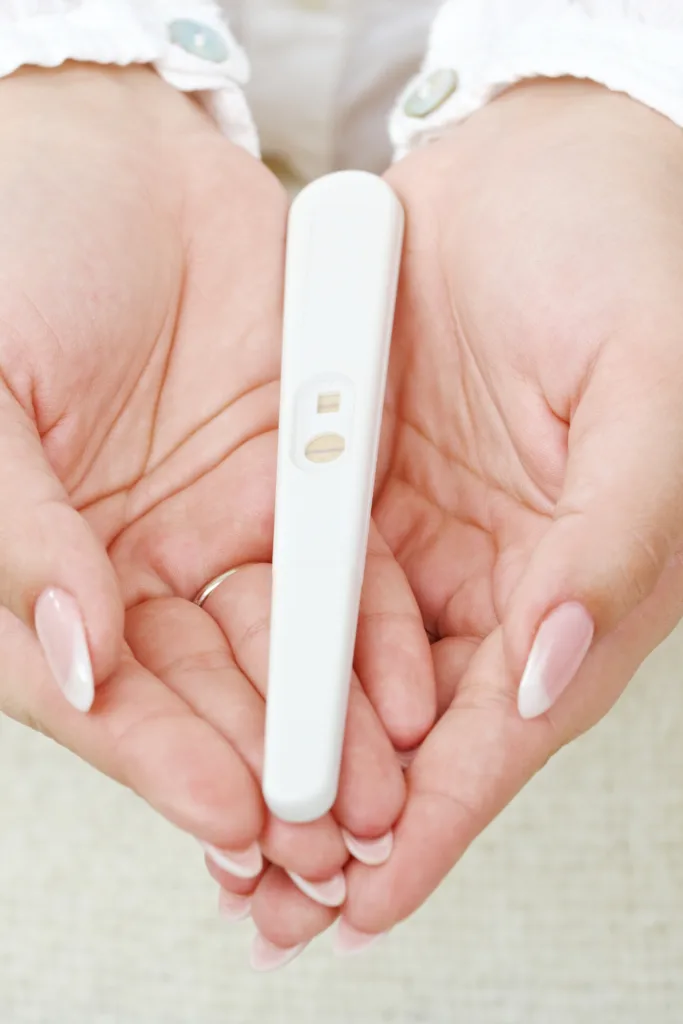Whether you were trying for a baby or just happen to be lucky enough to conceive without trying, getting a positive pregnancy test is a bit of a shock.
There are four responses women typically have to a positive pregnancy test:
- Utter disbelief or shock
- Immense happiness
- Incredible sadness
- Panic
Panic mode is completely normal when you find out you’re pregnant. The question becomes- “What do I do next?”
Don’t worry. Take a deep breath and take the following necessary steps to navigate this new transition in your life of becoming a mom!
Disclosure: Bear in mind that some of the links in this post are affiliate links and if you click on them to make a purchase I will earn a commission. Keep in mind that I link these companies and their products because of their quality and not because of the commission I receive from your purchases. The decision is yours, and whether or not you decide to buy something is completely up to you.
Celebrate!
A baby is a celebration! It doesn’t matter if it’s a complete surprise or you’ve been trying to conceive for a while, having a baby is a life-changing event that gives you a reason to celebrate.
Tell your special guy he’s going to be a daddy…
Go out to your favorite restaurant to celebrate (Shirly Temple drinks only)!
Even if you are in panic mode, shock, or sadness, celebrating the new life inside of you may help you relax and lift your spirits (hopefully).
Try to celebrate your pregnancy by:
- Taking weekly ‘bump’ pictures with THESE weekly pregnancy signs
- Frame your first ultrasound photo
- Take a spa day
- Start making a list of baby names (this may increase bonding early on by giving your baby a name compared to saying ‘the baby’)
Schedule A Prenatal Appointment
Although a positive home pregnancy test certainly indicates a successful conception, however, it’s important to get it confirmed with a doctor.
While some women choose to see a doctor at the 4 to 5-week mark, this is early.
Most women wait until 8 weeks to see their doctor.
You can go anytime between your positive pregnancy test and 8 weeks. However, I would not wait past 8 weeks for a prenatal appointment unless you have only just found out after the 8-week mark.
Your doctor will likely do an ultrasound (baby’s first picture) and your last known period to calculate your due date.
Plus, your doctor will conduct tests for elevated blood sugar (pregnancy diabetes), a pap smear, and a lot of bloodwork for a host of different things.
Related Articles: Everything You Need To Vanish 1st Trimester Symptoms
The Ultimate Guide For Treating Pregnancy Pains
15 Nursery Hacks For Small Living Spaces
Start Taking A Prenatal
Sometimes our diets may be lacking on certain nutrients. That’s where vitamin supplements come into play.
If there’s ever a time in your life to be getting enough nutrients it’s during pregnancy!
A prenatal vitamin taken once a day will set your baby’s development on the right path and will reduce the likelihood of neural tube defects.
Prenatals also contain a daily dose of iron to supply oxygen to the placenta and fetus.
Just be warned that many women experience constipation due to an increase in iron supplements.
Here are some great prenatal options for the duration of your pregnancy:
- SmartyPants
- Garden of Life
- Rainbow Light prenatal one
- MaryRuth Organics Prenatal + Postnatal Liquid Vitamin
Tell or Wait?
This is a difficult decision to make. While you want to tell the world about your pregnancy because you can’t contain your excitement…
There are times you may want to hide the news for a while.
Let’s face it, a baby changes everything! But sometimes if you have too many fears about pregnancy and motherhood, the news may need to wait.
For my first pregnancy, it took me two and a half years of fertility treatment and I was terrified of saying anything to anyone!
While my husband and my mom knew, that was it! We didn’t make an official announcement till the 12-week mark. Why?
We waited till week 12 because miscarriage rates are significantly reduced. According to Healthline, a pregnancy at 6 weeks with a confirmed heartbeat has a 10% chance of miscarriage.
By 12 weeks, the miscarriage rate drops to 5%.
Be advised that miscarriage rates vary from woman to woman and are determined by a variety of factors including genetics, age, and health conditions.
I was worried after so much hard work to get pregnant it would be taken away by a miscarriage.
Although I had nothing to be concerned about, it was still my paranoia that kept us from telling the world about our pregnancy.

Find Out Your Insurance Coverage
I can’t state this enough: Talk to your insurance after you have confirmed your pregnancy with your doctor!
You may think insurance will pick up the tab for all the prenatal visits, labor, and delivery. But insurance always has a way of surprising you.
It’s important to know:
- What percentage of prenatal visits and delivery will be covered (Example: insurance pays 80% each visit; you pay 20%)
- What medications and procedures related to pregnancy, labor and delivery your insurance will pick up
- How high your deductible is (some insurance companies require a certain amount out of pocket before they will cover 80% or more for labor and delivery)
- Find out if your insurance will cover services like midwife services, water birth, home birth, etc.
While insurance under state law cannot deny you coverage due to pregnancy and birth, they can make things expensive and complicated for you.
It’s best to know your coverage before you start receiving bills so you are not blindsided by the costs.
FYI- Sometimes any costs incurred during pregnancy (ultrasounds, procedures, prenatal appointments) are added up after you give birth and you will receive a very large bill after delivery!
I don’t know if this occurs in all states, but it’s great to know ahead of time because it is a shock to see the total charges in one bill for pregnancy, labor, and delivery!
Even though insurance will cover some of the bill, the remaining amount could still be in the thousands.
Review Your Family Income and Budget
Now that you’ve talked to insurance to see what is covered and the cost of the services you want related to pregnancy and birth, start saving money!
Babies are not cheap to raise. However, the first child typically costs the most because of all the “big ticket” items like a rocker, crib mattress, and crib that ten to cost a lot of money.
The USDA states the cost of raising a baby for the first year is around 13,000, excluding the cost of labor and delivery!
To pay for your cost of delivery and anything your baby needs, start reviewing your income. See how much money you are bringing home and find unnecessary purchases you can take out to decrease your monthly savings.
For some people, it’s as easy as not buying a cup of coffee from the corner coffee shop before work.
If you’re a coffee to go type person, take the amount you would spend on coffee per day and throw that amount into savings.
Here are some simple calculations to help you understand:
You buy a coffee each day that costs $4.95. You work five days a week, so the amount you spend per week on coffee every day is $24.75.
Instead of buying coffee with that money, take $24.75 and put it into savings at the end of the workweek.
After one month, you will have $99 dollars in savings for your baby you would have spent of coffee.
Related Articles: The Benefits Of The Golden Hour After Birth
23 Crazy Pregnancy Myths Not To Believe
20 Items To Stock Up On Before Baby Arrives
Start Thinking About Work
Many women face a dilemma between working and staying home to raise their children.
Some women may start out only wanting to take a short maternity leave and then decide not to return to work to raise their child at home.
However, many families face the complication of affording childcare and working outside the home.
For some families, it’s easier to cut down to one income than to have two incomes and afford childcare.
That’s because the second income would mostly go toward childcare services.
But for the sake of argument, let’s say your fulling want to return to work after you have a child. (Which is great!)
Now is the time to find out if your work offers…
- Paid or unpaid maternity leave
It’s important to note- Your work is required by law (Family and Medical Leave Act) to protect your job while on maternity leave for up to 12 weeks.
However, just because you are guaranteed time off with your newborn does not mean you will be paid.
That’s up to the discretion of your employer.
For most families, 12 weeks of maternity leave is unpaid. You should plan to cover your expenses during maternity leave by budgeting your income and saving for the 12 weeks.

Final Thoughts
Just breathe! Everything is going to be alright! Yes, a baby is a life-changing event. But your life is about to get spectacular!
Although your initial reaction may be shock or even horror, find a way to celebrate!
You’re becoming a mother. It’s extra special if you’ve been trying to conceive for a while.
However, there are a few things you need to take care of to relax your mind and prepare your life for your bundle of joy!
Works Cited
I got a positive pregnancy test-now what?
Insurance when you’re pregnancy

